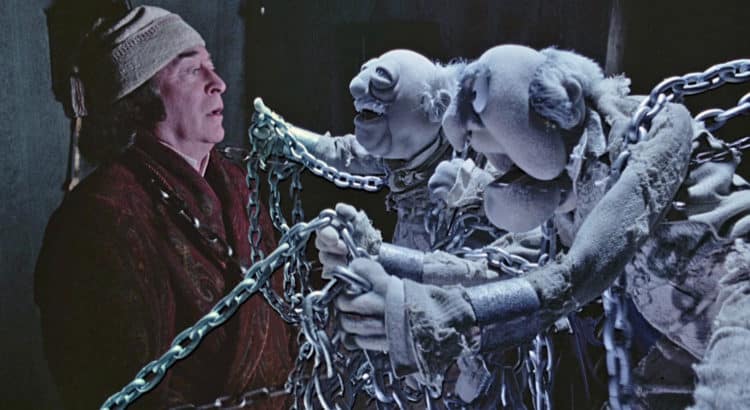A sermon for the Sixteenth Sunday after Pentecost, Year C (Proper 21: Jeremiah 32:1-3a; 6-15, Psalm 91:1-6, 14-16; 1 Timothy 6:6-19; Luke 16:19-31)
**
Of all the genius bits of casting in The Muppet Christmas Carol, my favorite comes in the very first scene.
“The Marleys were dead to begin with,” says Gonzo as Charles Dickens, though that’s not my pick.
I was too young to spot the change back in 1992. But I can imagine Dickens fans in the theater being both GRATEFUL for the direct reference to the first line of the book, and also CONFUSED about Marley suddenly becoming plural.
My friends, it had to be thus. Because Jacob Marley—and now also Robert Marley—simply had to be played by Statler and Waldorf.
If you’re not a Muppets fan and need the wikipedia summary for these two, this excerpt should do it:
Species: Muppet humans
Occupations: Hecklers, curmudgeons, comic relief
How else could the Muppets tackle A Christmas Carol and its bizarre premise and intense social commentary? How else could you make a kid-friendly movie of what seems to have been a Dickensian remix of today’s parable.
I mean, within moments of coming on screen, these two puppets are singing “You’re DOOMED, Scrooge. You’re doomed for all time. / Your future is a HORROR STORY written by your crimes.”
This is not usual Muppets territory. But because it’s Statler and Waldorf, we’re still chuckling at their last grandpa joke.
And we’re unsurprised and even charmed when “the chains the Marleys forged in life” turn out to be binding them to adorably animate little Muppet treasure chests. In fact, those boxes themselves float up to finish the song’s final verse.
The prospect of eternal torment was never so funny and so cute.
**
The Muppets succeed in SIDELINING a distracting detail in the premise of today’s gospel story, which some believe to be the inspiration for A Christmas Carol: Through humorous misdirection, they help us see past the somewhat grisley frame of this parable and look instead at the challenging picture inside it.
It’s easy to fixate on the detail of “the chasm” that separates the Rich Man from Lazarus in death, the great dividing line in this apparent afterlife.
But this is not a parable about if Hell exists, who might go there, or for how long. The imaginative setting is just the backdrop for the conversation Jesus wants his characters to have.
The striking detail of “the chasm” IS meant to catch our attention, but in order to point back to another detail: the Rich Man’s SECURITY GATE in life.
It’s as if Abraham is saying, “You isolated yourself then. So too are you isolated from us now.”
The Rich Man wanted to keep Lazarus at a safe distance: off his doorstep and out of his neighborhood. He didn’t want to have to see a poor and hungry man covered in sores as he took his own sumptuous feasts with wealthy friends in their fine clothes.
Marginalized people from every generation and era have had to grapple with going not just ignored but sometimes literally unseen. Upstairs/downstairs, front-of-house/back-of-house, one side or the other of the tracks or the river—
In Jesus’s day, in Dickens’s day, and in ours, the rich and powerful concoct ways to separate themselves from the people who make it possible for them to be rich and powerful. And then to varying degrees they ignore, rationalize, or even forget that they have done so—at least until they run out of space on the picturesque side side of the tracks, or the Lazaruses run out of space or patience on the run down and polluted side.
Dean Arthur Penrhyn Stanley of Westminster Abbey, who preached there on the Sunday after Charles Dickens death, certainly believed that this social dynamic motivated both Dickens’s and Jesus’s stories: He said, “By [Dickens] that veil was rent asunder which parts the various classes of society. Through his genius the rich man … was made to see and feel the presence of Lazarus at his gate.”
**
I sometimes get frustrated that this parable is cited by fundamentalists in support of common discourses around Hell and our need to shape up, lest we get sent there.
But try as I might this week, I wasn’t able to think of a more appropriate way for Jesus to make his point about the cruel and calcified ways we literally separate one life from another. Where else but on the very threshold between life and death could so important a conversation take place?
So although the fire and brimstone folks are unlikely to take their moral theology from Dickens’ Christmas Carol—let alone The Great Gonzo’s—I’d simply want to point out one last thing: At least in my reading and viewing, it wasn’t fear that ultimately brought Scrooge around to the need to turn from his Marley-esque ways.
It was love, and laughter, and compassion. It was the obvious and abundant joy he witnessed in places he’d never bothered to look.
So if you think Dickens was at all on the right track in reimagining Jesus’s parable to give the Rich Man half a chance, here’s my Cliff’s Notes on the meaning of both.
Don’t fear the chasm that might separate us from each other in some unknown great beyond. Fear the chasms that separate us from each other’s love and friendship right here, right now.

